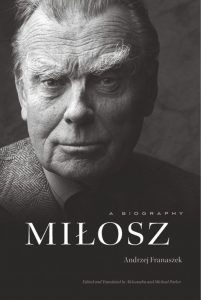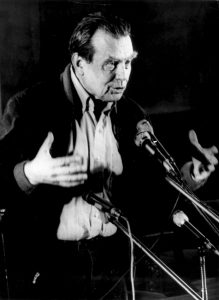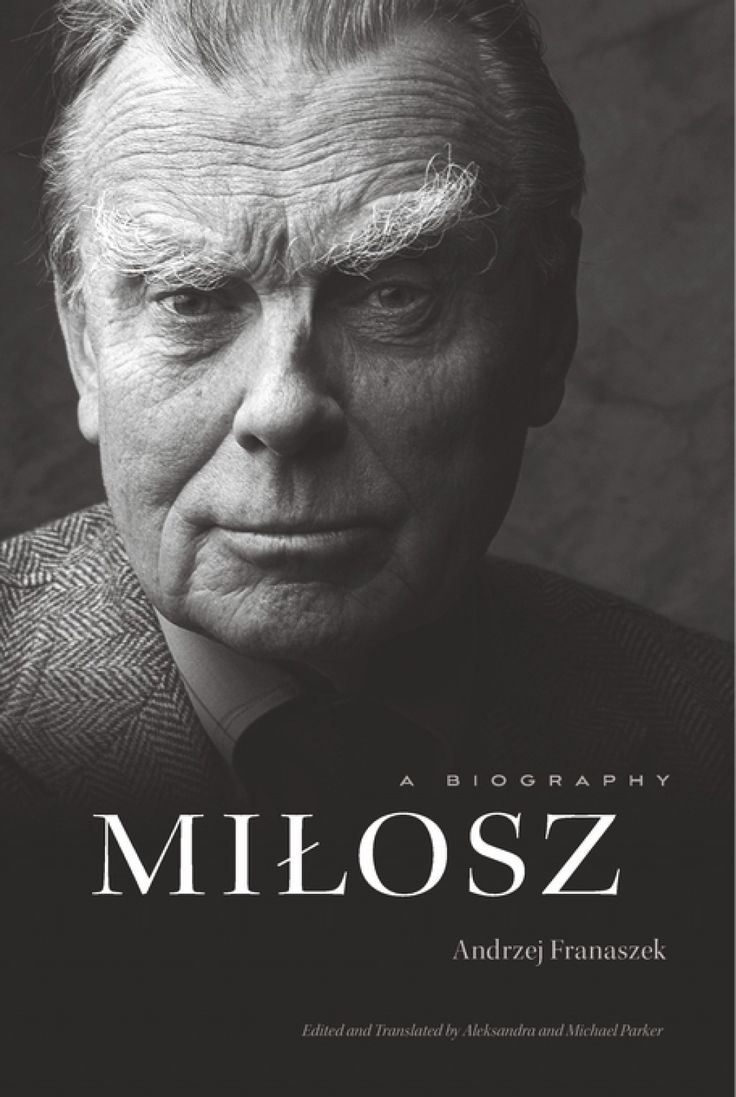 [A review of Milosz: A Biography by Andrzej Franasszek, edited and translated by Aleksandra and Michael Parker, The Belknap Press of Harvard University Press, Cambridge University, 2017, 526 pp., $35]
[A review of Milosz: A Biography by Andrzej Franasszek, edited and translated by Aleksandra and Michael Parker, The Belknap Press of Harvard University Press, Cambridge University, 2017, 526 pp., $35]
“What is poetry which does not save/Nations or people?” – Czeslaw Milosz (“Dedication”)
In the 1970s – the last full decade before Poland finally freed itself from the shackles of communist control –Lech Walesa, the leader of Solidarity, the Soviet bloc’s first trade union, was arrested on more than one occasion. In one instance his “crime” was possession of a copy of Polish exile Czeslaw Milosz’s seminal 1953 nonfiction work The Captive Mind, which was banned by the government.
When the crumbling of the communist edifice quickened in the early 1980s, Polish film director Andrzej Wajda featured a reading of Milosz’s poem “Hope” in his 1981 Palme d’Or prize-winning and Academy Award nominated drama Man of Iron.
The poem, part of a sequence titled “The World,” reads in part:
Hope is with you when you believe
The earth is not a dream but living flesh,
That sight, touch, and hearing do not lie,
That all things you have ever seen here
Are like a garden looked at from a gate.You cannot enter. But you’re sure it’s there.
Could we but look more clearly and wisely
We might discover somewhere in the garden
A strange new flower and an unnamed star.
It was not so long ago that poets and polemicists possessed influence that extended far beyond the university and Nobel recognition and into the fiber of social and political life at all levels. Josef Brodsky, Aleksandr Solzhenitsyn, Milosz and Saint-John Perse are but several of the past century’s literary artists who spilled gallons of ink on words and ideas seared into a weltenshauung starved of freedom.
It should be added that many of them did so at great personal expense. Only the most culturally hubristic could assume a Solzhenitsyn, Brodsky or Milosz might have considered themselves more fortunate after granted refuge in America. For the Lithuanian-born Milosz, specifically, exile was a difficult proposition.
For one, he had to encounter the hostility of Polish intellectuals (the wrath exhibited toward him by the drunk fellow poet Zbigniew Herbert, for example, was echoed throughout Polish cultural salons). There were those writers and tastemakers who never forgave Milosz for defecting to the West only to return to Poland after the dismantlement of the Iron Curtain.
Second, exile from familiar environs, family and friends exacerbated Milosz’s naturally depressive nature. At some point while in Paris, Andrzej Franaszek relates in his magnificent and impeccably researched biography of the poet, Milosz came close to both a complete mental breakdown and suicide.
Additionally, as with Solzhenitsyn, adapting to life in America was difficult for Milosz. Both writers despised the materialism they witnessed in daily American life, and Milosz went to great lengths to disparage the U.S. public’s addiction to television and what he perceived as the nation’s cultural provincialism.
Further, Milosz continued to write in Polish while publishing mainly in European periodicals. His work appeared in the United States after finding translators or performing the task himself. Fortunately, Milosz’s was a tireless writer, and little time passed between publication of his essays, novels and poems throughout his professional life.
Those efforts paid off handsomely – he was awarded the Nobel Prize for Literature in 1980, which only increased his international respect among students of literature. Numbered among his many admirers was Pope John Paul II, who observed that, in his works, Milosz “always make[s] one step forward, then one step back” when it came to embracing Christianity. Milosz responded to the pontiff: “Is it possible to write religious poetry any other way at the present time?” Others drawn to both Milosz the individual and Milosz’s mythopoetics included Susan Sontag, Thomas Merton and 1995 Nobel laureate, Irish poet Seamus Heaney.
Throughout Milosz’s oeuvre, however, exists strains of the religious mysticism of William Blake and – heretofore unknown to this reviewer – French Roman Catholic philosopher Jacques Maritain and Milosz’s uncle Oskar Milosz. The elder Milosz, noted by Franaszek, once argued about what constituted real poetry with none other than Oscar Wilde. Oskar Milosz asserted that “hierarchy, mystery and metaphysical sensitivity were fundamental to great art, whose function it was to enrich the human spirit and mind.”
The nephew in fact was responsible for much of the existing translations of his uncle’s work as well as extensive translations into Polish of the Bible. One may discern a whiff of secular humanism in a poem such as “If There Is No God,” but they’d miss the influence of Oskar Milosz:
If there is no God
Not everything is permitted to man.
He is still his brother’s keeper
And he is not permitted to sadden his brother
By saying that there is no God.
Elsewhere, Milosz explained his approach to Christianity was tainted by his inability to live up to the virtues he championed, a crisis of faith inculcated by a lengthy exposure to communism:
My books are full of respect for conventional virtues and, thought that role was never intentional, I could sometimes be considered a moralist. I was deeply ashamed of my lack of virtue, and was reluctant to say, “Yes, I admit to that, that’s what I am like and that’s it.” This lack of virtue had its origin from a clash in my relationship with collective entities … and could be described as excessive individualism.
This dark night of the soul prompted Milosz to seek counsel from Pope John Paul II:
[I]n the last few years I wrote poems in which I consciously adhered to Catholic orthodoxy, but I am not sure whether I was successful in achieving that, I, therefore, ask for your words confirming my pursuit of our common goal. Let’s hope Christ’s promise of Resurrection comes true.
The pontiff’s response came within a fortnight:
You write that the subject of your concern was whether your work ‘adhered to Catholic orthodoxy.’ I am convinced that this intention is of decisive significance. In this sense, I am happy to confirm your words about our ‘pursuing a common goal.’ From the bottom of my heart, I also would like to wish that the promise Christ gave to the whole of humankind through his Resurrection comes true for you. I wish God’s blessings on you, your life and work.

It’s fortunate Milosz’s literary legacy is preserved in Franaszek’s biography, and it is hoped it serves to reinvigorate the inclusion of Milosz’s works on college syllabi. Franaszek, an assistant professor of Polish Literature at Krakow’s Pedagogical University, proves again and again his wide-ranging ability to marshal extensive biographical details aligned as well with an ability to approach the poetry and private documents of Milosz with sensitivity and scholarly discipline. In short, Milosz: A Biography is a literary triumph.
